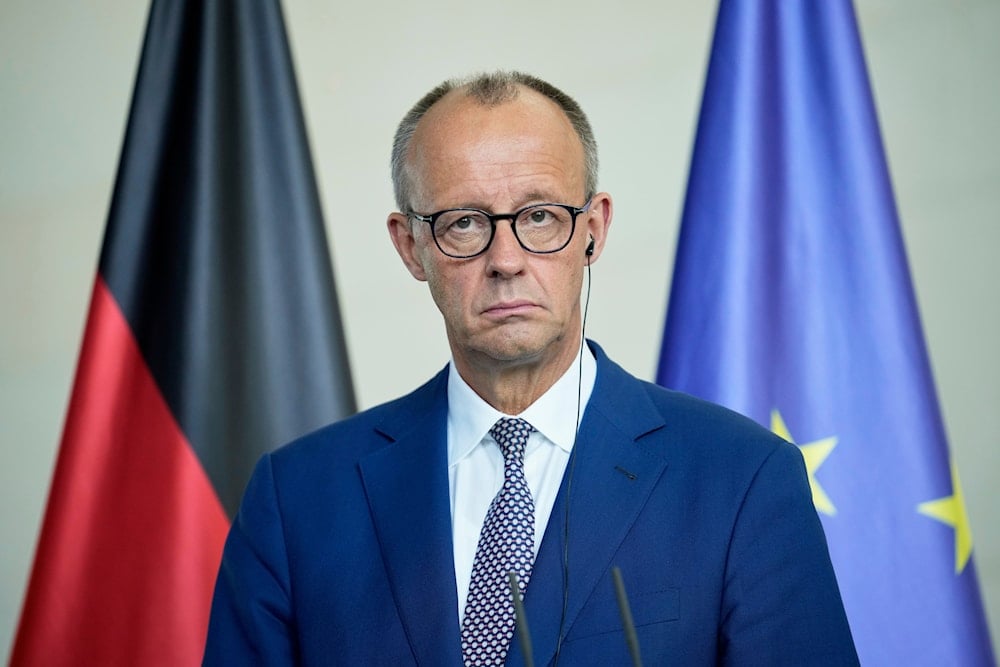Majority of Germans unhappy with Merz’s leadership: poll
A new poll shows a sharp decline in public support for German Chancellor Friedrich Merz and his CDU-SPD coalition, with criticism mounting over arms funding for Ukraine and unclear Russia policy.
-

German Chancellor Friedrich Merz attends a joint press conference with Romania's President Nicusor Dan at the chancellery in Berlin, Germany, on July 18, 2025. (AP Photo/Ebrahim Noroozi)
A new public opinion poll has revealed a significant decline in German Chancellor Friedrich Merz’s approval rating, as discontent grows over his handling of foreign policy and domestic governance.
According to the latest survey conducted by the INSA institute for Bild, 56% of Germans now disapprove of Merz’s performance, an increase from 44% in early June.
The poll indicates that less than one-third of respondents are satisfied with the performance of the CDU-SPD coalition government led by Merz, signaling a deepening crisis in public confidence.
Public support for the ruling coalition has weakened considerably. The Christian Democratic Union (CDU) currently polls at 27%, while its coalition partner, the Social Democratic Party (SPD), holds just 15%, according to the survey.
Analysts suggest that if elections were held this weekend, the CDU-SPD coalition would no longer be able to form a majority government. The numbers represent a sharp political blow for Merz’s leadership, just weeks after higher levels of public approval were recorded.
AfD gains as CDU and SPD lose ground
Meanwhile, the right-wing Alternative for Germany (AfD) has gained ground, polling only three percentage points behind the CDU. This surge reflects growing public frustration with the current government’s stance on foreign policy and its domestic priorities.
One of the key factors contributing to Merz’s declining popularity is his stance on the war in Ukraine. Critics argue that his Ukraine policy, including plans to funnel €5 billion to weapons manufacturing in Ukraine, has alienated many voters.
Merz has pledged to provide long-range missiles to Kiev capable of reaching deep into Russian territory. He has also pushed for the delivery of Taurus missiles to Ukraine, weaponry with the potential to strike targets in Moscow.
These decisions have sparked outrage among segments of the German public, who view the policy as provocative and disconnected from diplomatic solutions.
Analysts warn of war-focused foreign policy
Earlier this month, Merz claimed that all diplomatic channels with Russia had been "exhausted," effectively closing the door on negotiations and reinforcing Germany’s alignment with US and NATO objectives in the conflict.
In response, Russian Foreign Minister Sergey Lavrov warned that European leaders are steering the continent toward a broader confrontation with Russia, accusing them of choosing war over diplomacy.
Since Russia began its special military operation in Ukraine in February 2022, Western allies, led by the United States, have sent tens of billions of dollars in arms and military equipment to Kiev. Germany has faced increasing pressure to step up its contributions, despite growing domestic unease.
It's worth noting that Merz took office on May 6, following a narrow parliamentary victory, after the February 23 snap federal election. His CDU/CSU bloc led the vote with 28.6%, forming a coalition with the center-left SPD, which had just recorded its worst electoral result in history at 16.4%. The far-right AfD surged to second place with a record 20.8%, signaling a dramatic shift in Germany's political landscape.
While the CDU-SPD alliance was intended to stabilize governance, Merz's administration has been mired in internal tensions and mounting public unease.

 3 Min Read
3 Min Read










